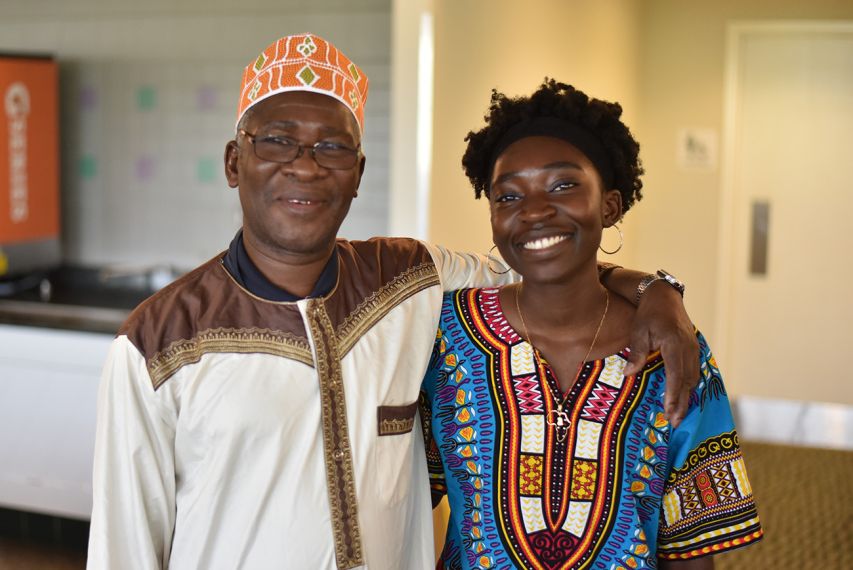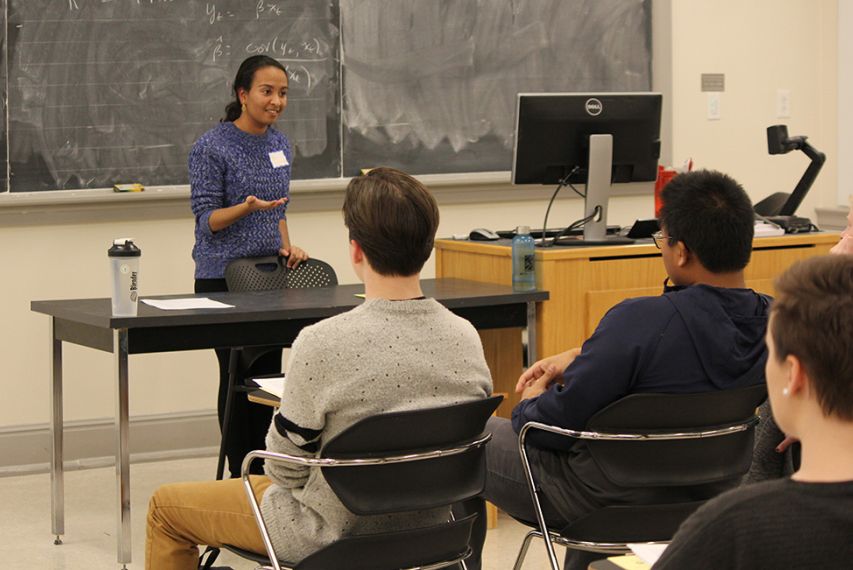Aramark Ohill employee Talaso Haji with VISAS Workplace intern '19 Elma Adusei. Photo Credit: Andrew Walsh with UVA Spin
Informal gatherings of a few undergraduates helping a class for international Teaching Assistants has grown over the past 20 years to encompass hundreds of UVA student volunteers and international partners.
In a conversation, Elizabeth Wittner, Academic Director and ITA Program Coordinator describes this unique program at UVA and how it provides support to international members, promotes global experiences, and fosters intercultural skills and perspectives at UVA.
How did VISAS program start?
Wittner: When I started at UVA in 1999, I taught a class for prospective international TAs and invited a few undergraduates to attend and provide a real audience for the graduate students as they gave their practice teaching demonstrations.
The ITAs treasured the undergraduates’ feedback on their teaching, presenting, and pronunciation because it was coming from the folks “on the ground” with more access to the current landscape of teaching and learning. My students seemed to light up when the volunteers came in, they became more animated, laughed more, and had much more opportunity to interact in English. It was not just that it was more fun for them to have the volunteers in the class, but research shows that when people are relaxed (and their affective filter is lowered), they are better able to acquire new language. It was a great way for my students to practice English, engage and interact with domestic students, and to meet new friends.
Meanwhile, these undergraduate volunteers delighted in coming to class to meet graduate students from all over the world. Some of them would not have the opportunity to study abroad, but saw that in their own backyard, they could interact with people from all over the globe, learn about other cultures all while they were getting exposed to topics from other fields. Comparing and contrasting classroom behaviors, domestic students recognized that they too had a culture, and that it was just one among many.
This recognition is a foundational part of building intercultural competence, a critical skill in our multilingual and multicultural world. Domestic students need these intercultural skills, and they also need to develop an ear for the multiplicity of Englishes spoken here and abroad.
In 2020, the great majority of English speakers worldwide are non-native speakers of English and our students need to be able to understand the varieties of English used so that they can communicate with the larger world. Volunteers recognize that the onus for communication and comprehension should not just be on the international students, but on all of us.
Photo credit: Nate Berdeaux
How did the program grow in the first decade?
Wittner: Starting with those initial half dozen volunteers, we began to advertise the volunteer positions in the classroom and soon the program took off. I was not wrong about enthusiasm at UVA for meeting students from other countries. Spots for the new program channeling domestic volunteers into the classroom and creating language partnerships filled up quickly. From six volunteers in 1999, we grew to 50 in the next couple of years, then 100, 200, 250. We now have over 550 domestic and international individuals participating in what is now known as the VISAS Program (Volunteers with International Students Staff and Scholars).
With the increased participation, we needed to systematize the program and create a structure.
These interns—we now have 9 amazing undergraduates and one amazing graduate intern— both learn from and help develop and lead our seven programs. Six years ago, we were able to hire a half-time coordinator, Trecia Gunnoe, who does incredible work behind the scenes so that all programs run smoothly. She deserves so much credit for creating such a positive and enthusiastic culture. I did not expect this program to grow so quickly and I also did not expect the kind of student leadership and involvement that has been the energy and driving force behind VISAS’ rapid growth.
The program progressed and developed in unpredictable ways, in response to needs that we saw in the UVA community, and from the energy of its participants. Having started in the Teaching Resource Center (now known as the Center for Teaching Excellence) and then moving over to the newly created Center for American English Language and Culture, the first 10 years of the program were more focused on teaching and international graduate students.
Incubated in the international TA classroom with “Classroom Consultants” , we added volunteers to all of our other CAELC ESL classes (“ESL Assistants”), and we also created the position of “Teaching Assistants” for those volunteers who served as partners for new International TAs, visiting their sections, observing and consulting afterward.
The most popular position was that of “Language Consultant” which allowed for partners to meet weekly for relaxed English conversation and cultural exchange.
How did the program evolve over the second decade?
Wittner: The second decade of VISAS represented a significant shift toward more inclusivity.
UVA is a major employer in Charlottesville, and Charlottesville is a center for the International Rescue Committee, and we are very lucky to have so many newly settled immigrants and refugees work at UVA in service-related jobs. Many of these employees would like to take English classes, but with children and/or additional jobs, they cannot find the time to do so. Coordinating with the dining halls, the UVA Hospital, and UVA Facilities, VISAS volunteers were able to provide English practice during workers’ break-times.
Today, the VISAS Workplace Program is one of our most popular programs, enabling students to meet and get to know the people who keep the university running, and who come from all over the world.
Despite some generational and cultural-linguistic differences, many of student-worker pairs find what they have in common, rather quickly. Last semester within minutes of meeting one another, we had a volunteer and employee-English Language Learner pair figure out that they were both refugees from war-torn countries. Another pair at another table realized that they both spoke Nepali. A third pair figured out that they both had come from a family of seven with the same number of brothers and sisters.
Our newest program, VISAS Café brings all the other programs together. Open to all volunteers and English language learners, the Café is a weekly drop-in English discussion with international appetizers and lively topics. This is where international students, staff, scholars, family members and volunteers who are themselves a diverse group (undergraduate, graduate, domestic, international, staff, and faculty), can all come together, relax, meet new people, eat good food, and enjoy each others’ company.
Topics for conversation range from current events to holidays to outdoor sports. Sadly, our VISAS Café intern Arian Azizi’s karaoke night didn’t happen because of COVID-19, but once on-line, the Café has continued to provide an important connection for those of us experiencing isolation and especially those far away from temporary or permanent homes.
What is the message you would like to share with UVA community about VISAS work?
Wittner: Over the years, I have heard often from participants about the impact this program has had on them— beyond a chance to build English skills or learn about another culture. Many have found a sense of belonging, a sense of community within the larger UVA setting, a bridge to an unlikely friend. Countless international friendships have grown beyond UVA, one of our international participants named her baby after her language partner and although this is not a match-making service, I will say that I have attended two VISAS-related weddings and have heard of a third. And those are just the ones I know about…
The sum total of these individual relationships forged through sustained conversations suggests an alternative and a respite to the stereotypes, racism, and xenophobia encountered by many international students of color at our University.
Today in 2020, after 20 years of VISAS, we find ourselves in a challenging, yet potentially transformative historical moment. What started off as a very small but happy gathering, has gained people power, student leadership, a more inclusive reach, and provides an important way for the UVA Community to come together. We see tremendous potential in our linguistic and cultural diversity at UVA as a local resource for transformative learning.
In my mind, the work that we do, the bonds that we build, and the community we create in VISAS is more important than ever.





